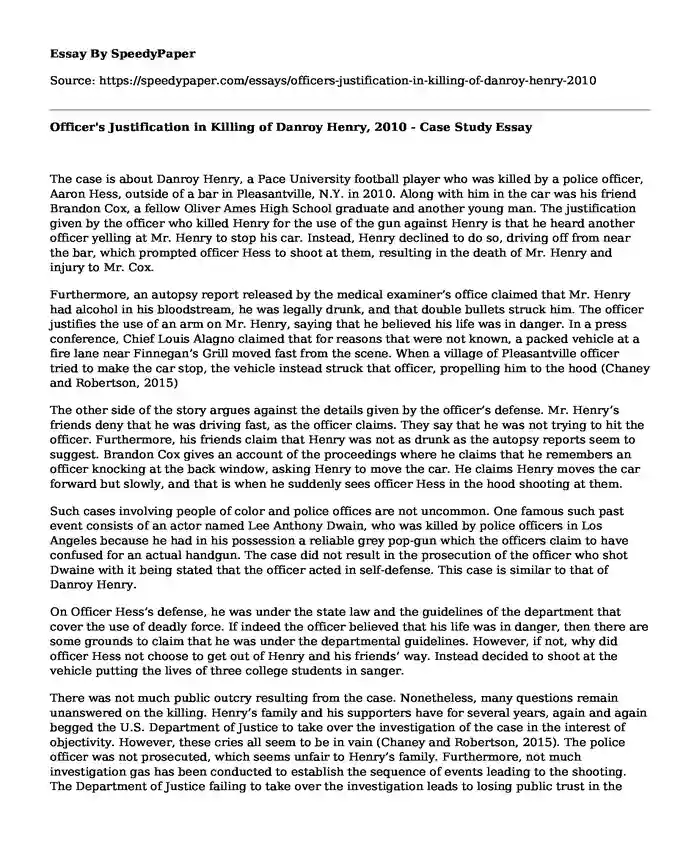
| Type of paper: | Case study |
| Categories: | Law Criminal law Justice Criminal justice |
| Pages: | 3 |
| Wordcount: | 673 words |
The case is about Danroy Henry, a Pace University football player who was killed by a police officer, Aaron Hess, outside of a bar in Pleasantville, N.Y. in 2010. Along with him in the car was his friend Brandon Cox, a fellow Oliver Ames High School graduate and another young man. The justification given by the officer who killed Henry for the use of the gun against Henry is that he heard another officer yelling at Mr. Henry to stop his car. Instead, Henry declined to do so, driving off from near the bar, which prompted officer Hess to shoot at them, resulting in the death of Mr. Henry and injury to Mr. Cox.
Furthermore, an autopsy report released by the medical examiner’s office claimed that Mr. Henry had alcohol in his bloodstream, he was legally drunk, and that double bullets struck him. The officer justifies the use of an arm on Mr. Henry, saying that he believed his life was in danger. In a press conference, Chief Louis Alagno claimed that for reasons that were not known, a packed vehicle at a fire lane near Finnegan’s Grill moved fast from the scene. When a village of Pleasantville officer tried to make the car stop, the vehicle instead struck that officer, propelling him to the hood (Chaney and Robertson, 2015)
The other side of the story argues against the details given by the officer’s defense. Mr. Henry’s friends deny that he was driving fast, as the officer claims. They say that he was not trying to hit the officer. Furthermore, his friends claim that Henry was not as drunk as the autopsy reports seem to suggest. Brandon Cox gives an account of the proceedings where he claims that he remembers an officer knocking at the back window, asking Henry to move the car. He claims Henry moves the car forward but slowly, and that is when he suddenly sees officer Hess in the hood shooting at them.
Such cases involving people of color and police offices are not uncommon. One famous such past event consists of an actor named Lee Anthony Dwain, who was killed by police officers in Los Angeles because he had in his possession a reliable grey pop-gun which the officers claim to have confused for an actual handgun. The case did not result in the prosecution of the officer who shot Dwaine with it being stated that the officer acted in self-defense. This case is similar to that of Danroy Henry.
On Officer Hess’s defense, he was under the state law and the guidelines of the department that cover the use of deadly force. If indeed the officer believed that his life was in danger, then there are some grounds to claim that he was under the departmental guidelines. However, if not, why did officer Hess not choose to get out of Henry and his friends’ way. Instead decided to shoot at the vehicle putting the lives of three college students in sanger.
There was not much public outcry resulting from the case. Nonetheless, many questions remain unanswered on the killing. Henry’s family and his supporters have for several years, again and again begged the U.S. Department of Justice to take over the investigation of the case in the interest of objectivity. However, these cries all seem to be in vain (Chaney and Robertson, 2015). The police officer was not prosecuted, which seems unfair to Henry’s family. Furthermore, not much investigation gas has been conducted to establish the sequence of events leading to the shooting. The Department of Justice failing to take over the investigation leads to losing public trust in the justice system.
References
Chaney, C., & Robertson, R. V. (2015). Armed and dangerous? An examination of fatal shootings of unarmed black people by police. Journal of Pan African Studies, 8(4), 45-78.
Traveler, F., & Pair, H. V. S. (2015). DJ Henry was a black man killed by police, should he be a cause? Sokoloffstern.
Cite this page
Officer's Justification in Killing of Danroy Henry, 2010 - Case Study. (2023, Nov 14). Retrieved from https://speedypaper.net/essays/officers-justification-in-killing-of-danroy-henry-2010
Request Removal
If you are the original author of this essay and no longer wish to have it published on the SpeedyPaper website, please click below to request its removal:
- Ways of Punishing Criminals - Criminal Justice Essay Example
- Law Essay Sample: Parole Release
- Essay Example on the Legal Environment of Business
- California Juvenile Court System: Delinquency, Dependency & Infraction - Essay Sample
- Africans Denied Freedom & Human Rights by Imperialists & Local Leaders - Essay Sample
- Free Essay Example - Changing the Game
- Real Solution to Ending Gun Violence in America - Essay Example
Popular categories




